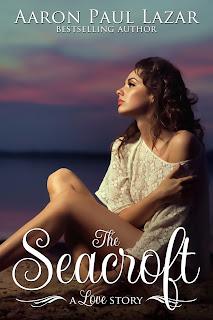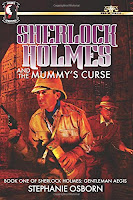My newest novel, A LITTLE ELFY IN BIG TROUBLE, has just been released as an e-book through Twilight Times Books. I'm extremely happy about this – if I weren't, there probably would be something wrong with me – but as Murder By Four is a website that mostly talks about the writing, publishing, or editing processes, I thought it might be interesting to talk about the unusual task I recently undertook – editing my novel, twelve full years after it was initially completed.
You see, my edit of A LITTLE ELFY IN BIG TROUBLE was unlike anything else I've done to date. Over the last twelve years, I've become a working editor, and have gained a great deal of ability during that time.
But as you may know (as I've guested at Murder By Four before), I also lost my husband Michael ten-plus years ago. He was a much more experienced writer than I, and far more adept as an editor, while I sat down and did the actual work of writing A LITTLE ELFY IN BIG TROUBLE in 2002 and 2003…and revised a bit during 2004.
Then my husband died. My life was upended. For a long time, I wondered why I was still alive at all – but for whatever reason, I just could not give up.
I kept sending my work around to publishers and agents. I garnered a few good comments, but no sales, mostly because both novels in the Elfyverse are comic young adult urban fantasies with a great deal of mystery and a dash of romance, besides. They are relentlessly cross-genre works, and that makes it harder for me to "brand" myself – a concept that's taken root in the ten-plus years it's been since Michael died, and refuses to die.
Though, granted, even before it was called "branding," readers tended to classify authors by what they wrote, less formally. Dorothy Sayers, for all her erudition, was classified as a mystery writer (with later mysteries sometimes being additionally labeled as romances due to the Peter Wimsey/Harriet Vane relationship). J.R.R. Tolkien was classified as a fantasy writer for good reason – and yet, he also was a gifted religious scholar (so, for that matter, was Sayers). And C.S. Lewis, despite his Chronicles of Narnia, was often categorized as a Christian apologist due to books like THE FOUR LOVES and MERE CHRISTIANITY – yet he, too, was a gifted scholar.
So, if these three giants of literature could get labeled as only one type of writer, when they actually wrote many different types of things in their careers, what chance do I have as a relatively new writer?
My father has a saying: Don't fight it, accept it. And that's basically where I'm at with regards to branding…but, as always, I digress.
After many years of trying to find a publisher who understood what I was doing, I found Lida Quillen at Twilight Times Books. She liked my work. And it's because of her that both halves of the Elfy duology have now been published (book one is called AN ELFY ON THE LOOSE).
The point I am trying to make, about editing A LITTLE ELFY IN BIG TROUBLE twelve years after I wrote it, is that while I recognized these words as my own, I saw them in a brand-new light. Because I have edited so many books (over sixty, maybe as many as seventy) in the past few years, I was able to see my work in the same way someone else would – or a reasonable facsimile, at any rate.
On my blog, affectionately known as Barb Caffrey's Elfyverse, I wrote in May (link is here:
https://elfyverse.wordpress.com/2015/05/18/a-monday-editing-blog-aka-whats-the-deal-with-the-second-half-of-elfy-barb/):
…you have to be in the right frame of mind to see what is actually in your own manuscript rather than what you think is there… What I try to do with the Elfyverse is to be consistent. I want to tell the best story I can. I’ve improved my actual writing mechanics a great deal since I originally wrote ELFY in 2002-3, and I want to reflect that…but I don’t want to take all the life out of the story, either.
And make no mistake about it: This is a full-on edit. It is not editorial changes, which is a much different animal. This is my own take on my own work, yes, but it’s also my older and wiser self editing my younger and more exuberant self, while trying to keep track of all the details — you may feel free to read “keep all the balls in the air” if you wish — at the same time.
You might be asking, "So, Barb. How is a full-on edit different from editorial changes?"
When you are dealing with editorial changes, you move more quickly through your manuscript – at least, I do – and you aren't as concerned with the intrinsic wholeness. You have to believe in your editor, and trust that he or she knows your writing well enough that you won't be steered off-course…and you have to trust that you will make the right changes in the right ways.
But in a full-on edit, you are looking at everything. Word choice, even if no one else has mentioned it. Whether you should add something at the beginning, because you now have two books where you once had only one. Whether you need additional scenes to clarify things, and if so, what?
And when you're done with your edit, you go back and make whatever changes are necessary.
In other words, I analyzed my manuscript as if it were written by someone else. I saw where it had weaknesses, as well as strengths. I tried to shore up those weaknesses. And I looked for ways to be consistent, without messing with my earlier style whatsoever – as, over time, I've become a slightly different writer.
Maybe you have another question at this point, something to the effect of, "So, Barb, what's the difference between a full-on edit and a rewrite? Especially since you're talking about adding things or rewriting them?"
A full-on edit is meant to help you, as a writer, figure out what else needs to be added to complete your novel and make it the best novel you are capable of writing. It is not a rewrite, because those usually mean you're starting from scratch, and you might use some of what you had before – or you might not.
It's a matter of emphasis, mostly. Analytical skills, perhaps. And certainly a matter of thoughtfulness, thoroughness, and sticktuitiveness…because when you edit for yourself, you have to believe you can see it as someone else does.
That's not easy. It might even be the next thing to impossible. But in this case, I felt it was the only way to get the job done…and I'm happy I was able to do it.
If you are looking to do some self-editing, whether it's for a novel, short story, or anything in between, keep the following things in mind:
· After you finish your draft, put it aside for a couple of days, if at all possible. (If time is short, get up, do something else for an hour or two, and come back to it.)
· When you do go back to it, read it aloud, slowly. Read it as if you're reading someone else's work, and try to find weaknesses. (You may not like doing that. But if you can find at least some of your own weaker areas, it will help your editor and/or your publisher down the line.)
· Then, go back and ruthlessly cut away anything that does not need to be there. If you have an overabundance of adjectives and adverbs (I often do), prune them back. If you use too many "thens," prune them back. If you shift tenses for no apparent reason, for goodness sake, go ahead and regularize those tenses.
· And by all means, do not rely on spellcheck or grammar check, especially if you write fantasy or science fiction. They may help you from time to time with an obviously misused or misspelled word, but because grammar check still sees "She said" as a simple sentence rather than an attribution phrase/dialogue tag, it's going to try to change your work and make it look – and read – wrong. (Plus, we F&SF writers often have words the spell and grammar check will hate. In my own work, the Elfy's language of Bilre is often flagged unnecessarily.)
If you keep all these things in mind, you may gain some insight into how to revise and edit your own work. That will make your editor and/or publisher much happier down the line, and also should promote greater mindfulness on your part as well.

--------------------------------
Links:
Blog:
http://elfyverse.wordpress.com
Book: A LITTLE ELFY IN BIG TROUBLE
Amazon:
http://www.amazon.com/dp/B018B4699W
OmniLit:
https://www.omnilit.com/product-alittleelfyinbigtrouble-1935228-234.html
Barnes and Noble:
http://www.barnesandnoble.com/w/a-little-elfy-in-big-trouble-barb-caffrey/1123003283?ean=2940157950910
Sample chapters:
http://www.twilighttimesbooks.com/ElfyinBigTrouble_ch1.html











